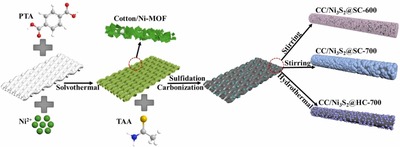MOF-derived Ni3S2@C grown in situ on modified cotton textileas self-standing electrodes towards high
performance sodium ion batteries
Abstract:Textile-based electrodes play an important role in realizing the application of wearable electronics. Nevertheless, weak interaction between active material and textile substrate and the volume expansion of nicel sulfides severely restrict the sodium storage performance. Herein, Ni-metal organic frameworks (Ni-MOF) as precursor are in situ grown on three dimensional porous cotton textile substrate, followed by solution-phase stirring/hy-drothermal reaction and pyrolysis, resulting in carbonized cotton textile (CC)/Ni3S2@SC and CC/Ni3S2@HC. Especially, CC/Ni3S2@HC composites present small nanoparticles, high conductivity, facilitated ion diffusion, and structural integrity, enabling excellent rate capabilities and long cycling stability. As anodes for sodium ion batteries, CC/Ni3S2@HC 700 electrode yields 268.2 and 140.6 mAh g−1 after 100 and 1000 cycles at the current density of 0.1 and 1 A g−1, respectively. Moreover, kinetic analysis shows that advantageous surface pseudo capacitive behavior ofthe CC/Ni3S2@HC-700 composites reaches 75 % at the scan rate of 2 mV s− 1. The reported method is versatile and can be extended to fabricate other textile-based transition-metal sulfides.

Peng B, Liu X, Cui ZN, et al.MOF-derived Ni3S2@C grown in situ on modified. self-standing electrodes towards high performance sodium ion batteries[J].Journal of Alloys and Compounds.